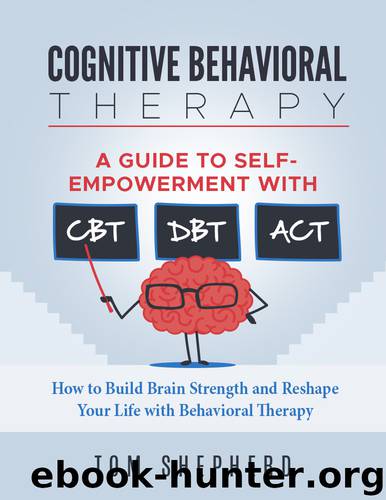Cognitive Behavioral Therapy: How to Build Brain Strength and Reshape Your Life with Behavioral Therapy: A Guide to Self-Empowerment with CBT, DBT, and ACT by Shepherd Tom

Author:Shepherd, Tom
Language: eng
Format: epub, mobi, azw3, pdf
Published: 2018-04-09T16:00:00+00:00
I don’t reside in anger
Weight: 60
Cost of Being Like John
People will not care how things could affect me
People will probably still do things that annoy me
They may step all over me
Weight: 30
Remember, the cost of anger is actually the cost of aggression. Even though it can be difficult to control our anger, we still have complete control over what we can do with this emotion.
We may choose to be passive, aggressive, angry-assertive, or passive-aggressive. It all boils down to our preference. Feeling anger can easily fast-track our response to our emotion and can present an illusion that we don’t have any choice. Yet we have to reshape our lives by considering how we decide to deal with our anger.
Step 1 - Recognize that a rule violation has occurred
In the CBT context of anger management, the first step is the recognition of a rule violation. We have specific rules as well as expectations that we follow for our personal behavior. We also use these rules to expect how people around us should behave. Hence, we can also feel the heaviness of the rules set by other people. The outcome is pressure, guilt, and anger. Are you familiar with the statements below?
I should have complete control over this situation.
He has the audacity to show his face to me?
That kid should listen to me!
My mom should support me on this.
Many people say these things out loud or internally. These are just some of the statements that indicate expectations. The problem is, in real life, people don’t always behave according to our expectations. In fact, people could be a stumbling block for us -- people don’t listen to us, and we may not have any control as to the outcomes of our actions.
It is crucial that we learn how to accept the given situation: accept reality instead of denying it or wishing it doesn’t exist. While we have complete control over our choices, the truth is that we also have minimal control over other people.
Then, we can follow a way that is in accordance with our personal core values. The challenge is getting to know these specific values. We can identify our values depending on what engages us, disappoints us, and angers us. In particular, we should pinpoint the positive values that underlie our rule.
For example:
If a person says something like “That kid should learn how to listen”, it indicates that he puts a premium on cooperation, understanding, and/or communication.
If a person says something like “He should learn how to work with me”, it could imply that he places importance on progress, respect, and freedom.
We don’t have control if other people respond with respect to our values. We can only have control if we do.
It’s also crucial to act on your values. Try to think of what you want for the long-term and the specific steps you can take in this direction.
People often ignore our rules and interfere with our lives. So how can you respond constructively if you face a similar situation? You can respond with fairness, truth, and respect.
Download
Cognitive Behavioral Therapy: How to Build Brain Strength and Reshape Your Life with Behavioral Therapy: A Guide to Self-Empowerment with CBT, DBT, and ACT by Shepherd Tom.mobi
Cognitive Behavioral Therapy: How to Build Brain Strength and Reshape Your Life with Behavioral Therapy: A Guide to Self-Empowerment with CBT, DBT, and ACT by Shepherd Tom.azw3
Cognitive Behavioral Therapy: How to Build Brain Strength and Reshape Your Life with Behavioral Therapy: A Guide to Self-Empowerment with CBT, DBT, and ACT by Shepherd Tom.pdf
This site does not store any files on its server. We only index and link to content provided by other sites. Please contact the content providers to delete copyright contents if any and email us, we'll remove relevant links or contents immediately.
| Administration & Medicine Economics | Allied Health Professions |
| Basic Sciences | Dentistry |
| History | Medical Informatics |
| Medicine | Nursing |
| Pharmacology | Psychology |
| Research | Veterinary Medicine |
The Art of Thinking Clearly by Rolf Dobelli(10455)
The 5 Love Languages: The Secret to Love That Lasts by Gary Chapman(9790)
Mindhunter: Inside the FBI's Elite Serial Crime Unit by John E. Douglas & Mark Olshaker(9324)
Becoming Supernatural by Dr. Joe Dispenza(8201)
Nudge - Improving Decisions about Health, Wealth, and Happiness by Thaler Sunstein(7693)
The Road Less Traveled by M. Scott Peck(7594)
Mastermind: How to Think Like Sherlock Holmes by Maria Konnikova(7323)
Enlightenment Now: The Case for Reason, Science, Humanism, and Progress by Steven Pinker(7306)
Win Bigly by Scott Adams(7184)
The Way of Zen by Alan W. Watts(6601)
Factfulness: Ten Reasons We're Wrong About the World – and Why Things Are Better Than You Think by Hans Rosling(4734)
The State of Affairs by Esther Perel(4712)
Gerald's Game by Stephen King(4642)
Man's Search for Meaning by Viktor Frankl(4584)
The Confidence Code by Katty Kay(4251)
Thinking in Bets by Annie Duke(4218)
The Healing Self by Deepak Chopra(3568)
Hidden Persuasion: 33 psychological influence techniques in advertising by Marc Andrews & Matthijs van Leeuwen & Rick van Baaren(3552)
The Worm at the Core by Sheldon Solomon(3486)
